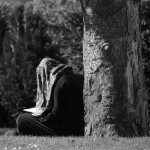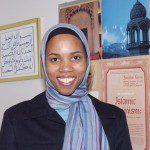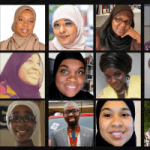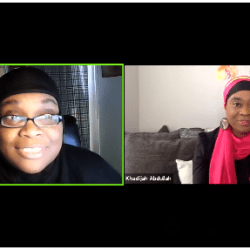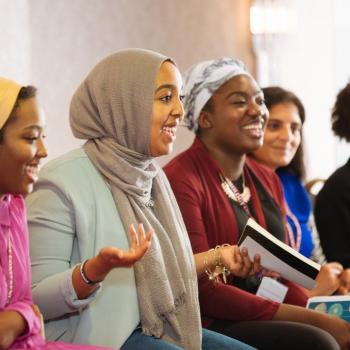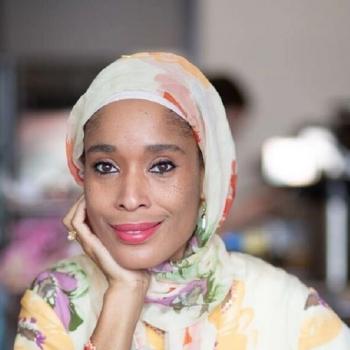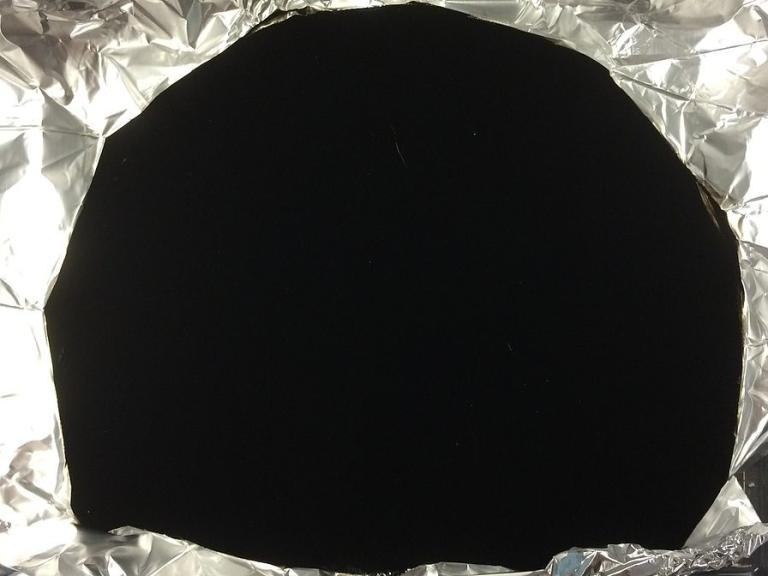
By Layla Abdullah-Poulos
One of the cool things about being a Black Muslim woman is that as soon as one month dedicated to understanding a cultural intersection (race) I embody concludes, it is time for another. Just when Black History Month ends, we begin to recognize the myriad of accomplishments made by women.
As we usher in Women’s History Month, I would like to highlight Black Muslim women who impact and influence the way many of us navigate through Muslim and non-Muslim societies. They are strong and committed to advancing Black Muslim perspectives, resist injustice in their respective fields and blaze trails for the rest of us to explore.
I call these fabulous Muslim women Vantablack Muslimaat because they embody some of the characteristics same of the unique and rare color:
- Not a color – Just like vantablack is not a color but a material, it takes more than skin tone to be a Vantablack Muslimaat. This particular breed of Muslim woman grows and develops into a force of strength that challenges the suppressive status quo and creates spaces to increase knowledge, awareness and empower those around them.
- Can’t be bought – One cannot purchase vantablack because “nanotubes that make up Vantablack must be grown using a complicated (and patented) process involving several machines, a few layers of different substances, and some extreme heat.” Similarly, a Muslimah becomes vantablack by remaining intrepid and fierce while acquiring knowledge and confronting pushback from those who seek to silence her. It involves more than simply knowing something is wrong or Instagram pics at the latest rally. Vantablack Muslimaat create and stabilize platforms that go beyond their individual assertions. Vantablackness is not available at stores or online via a tee shirt or bracelet.
- Super Robust – Although vantablack is, “sensitive to touch, it’s super sturdy against other forces, like shock and vibration,” which makes it good for when things get bumpy. The vantablack Muslimah is more than the latest Muslim woman to claim “woke” or “badass” status on social media “defying stereotypes.” She uses her knowledge and communication skills for more than mere performance. Instead, she is fully resolved to address hard-hitting issues within the Muslim ummah from an Islamic standpoint. She is not always popular, but she is totally okay with it.
I know I am going to get some heat from these phenomenal women about the problems of listicles like this one, but I am going to take the hit. Muslims across backgrounds and ideologies need to recognize!
Inshallah, this Vantablack Muslimaat list is the first I will feature during Women’s History Month, which barely even scratches the surface.
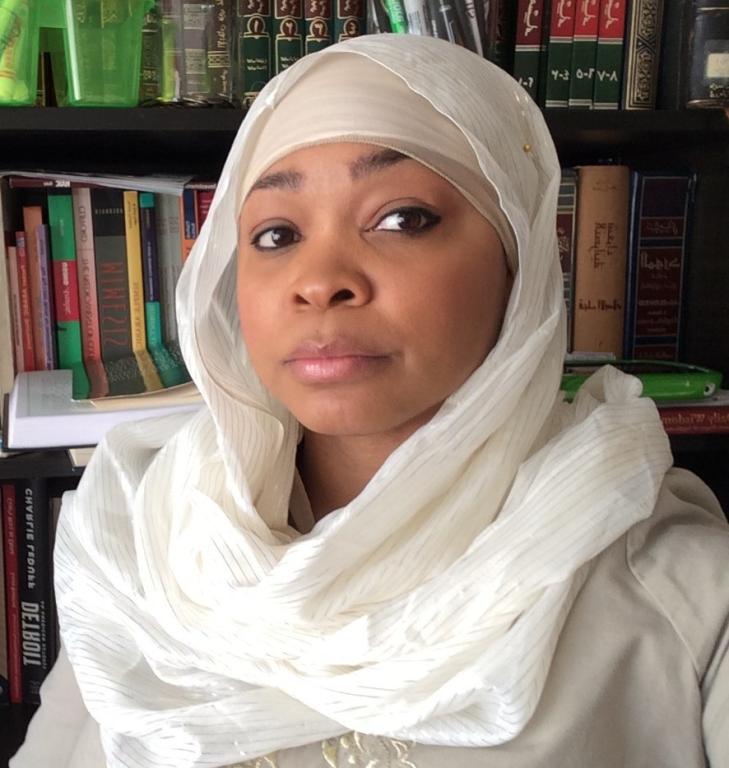 Margari Aziza
Margari Aziza
My vested interest is dismantling the systems that have us tearing each other apart.
Besides being a Muslim historian, adjunct professor, blogger, editor and freelance writer, Margari Aziza is the co-founder of the Muslim Anti-Racism Collaborative, a national organization that utilizes an educational platform to combat intra-cultural racism and anti-Blackness in Muslim communities and societal systems of oppression.
According to her organizational bio:
After converting to Islam in 1993, her life experiences as a Black American woman have informed her research and writing on Islam, education, race, and gender. She has nearly a decade of teaching experiences at all levels and has worked in education at various capacities. She earned her bachelor’s degree in History from Santa Clara University in 2003 and master’s in History of the Middle East and Islamic Africa from Stanford University in 2006. She has given talks and lectures in various universities and community centers throughout the country.
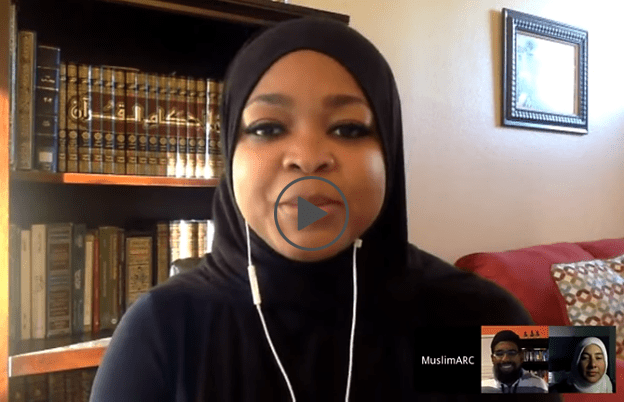
One of the many things that make Aziza so vantablack is her willingness to address issues of racism and antiblackness in Muslim spaces, where there tends to be the most resistance. Her presence at lectures across the country may incite anti-Blackness and misogynoir, but it doesn’t deter Aziz from using her expanse of knowledge and Islamic commitment to diminish oppression to chip away at social dysfunctions rooted in White supremacist capitalist patriarchy.
Visit Aziza’s:
- Blog – https://margariaziza.com/
- Twitter – @Margari_Aziza
- Facebook – https://www.facebook.com/Margari.Aziza/
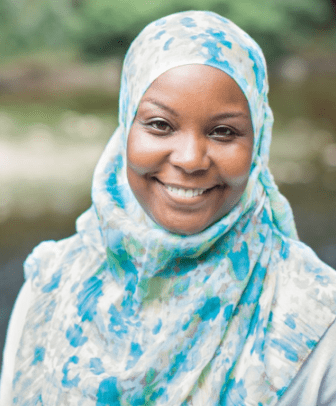 Kameelah Rashad
Kameelah Rashad
A victimized community is easily controlled, predictable. An empowered, educated community is powerful.
Kameelah Rashad founded the Muslim Wellness Foundation to promote health and well-being for American Muslims facing damaging psychological and physiological effects resulting from the trauma imposed on them through systems of oppression, addiction and mental illness.
Our core mission is to reduce stigma associated with mental health, addiction and trauma in the American Muslim community through dialogue, education and training. We envision a future in which faith communities are at the forefront of mental health advocacy and committed to developing an inclusive culture of compassion, understanding and support. In order to achieve this goal, we have adopted an interdisciplinary approach which addresses mental health challenges using a spiritually relevant community-based public health framework. MWF is leading the way by offering community based workshops and seminars, mental health first aid training and opportunities for professional development and networking. – Kameelah Rashad, Founder Message
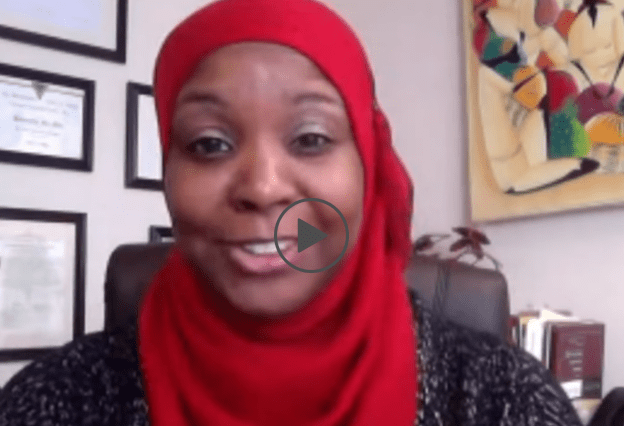
Rashad boldly centers the Black Muslim experience and issues of societal trauma stemming from systemic racism as well as anti-Blackness among Muslims. She is a strong proponent of self-care and sister care, encouraging Muslims active in social justice resistance to draw on Islamic teachings to heal.
Rashad is so fierce that they made a doll in her image!
Visit Rashad’s:
- Twitter – @KameelahRashad
- Facebook – https://www.facebook.com/kameelahrashad/
- Soundcloud – https://soundcloud.com/kamrashad
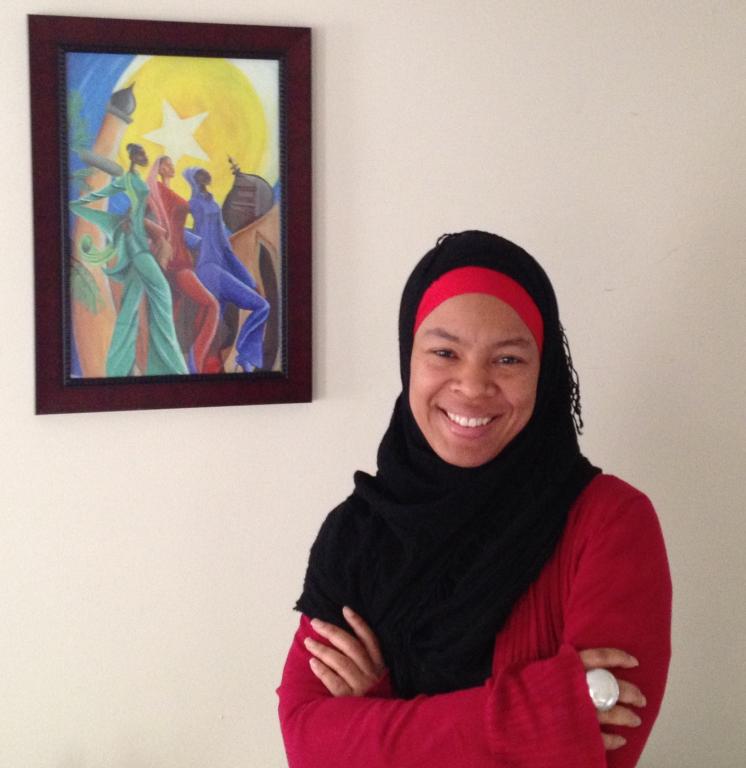 Donna Auston
Donna Auston
We have a dirty secret. Muslims have a terrible and cancerous race problem.
Donna “Tiny Muslimah” Auston is a fount of knowledge with a commitment to speaking out against injustice. She is a doctoral candidate in the Department of Anthropology at Rutgers University, where her research focuses on examinations of race, ethnicity, gender, the body, phenomenology and embodiment, religion, language, media representation, and Islam in America.
Auston has written numerous scholarly articles highlighting social intersections of race, religion and gender in the Black American Muslim experience. She is part of a group of Black Muslim female scholarship that brings attention to the layers of racism, Islamophobia and misogynoir Black Muslims face.
In addition to her scholarly works, Auston is a keen activist who guests lectures about and appears in media to elaborate on Black Muslim activism, police brutality, and protest.
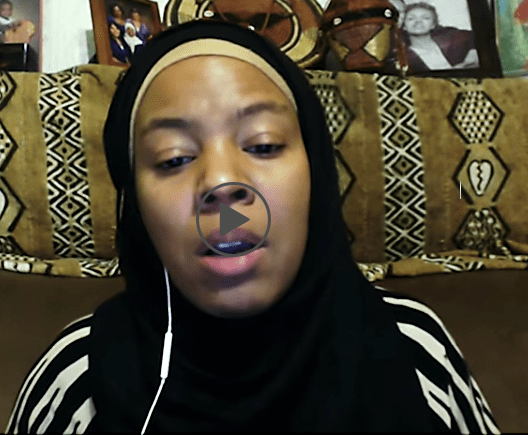
Weary of the constant erasure of Black Muslim voices, Auston launched #BlackMuslimRamadan in 2015, which went viral, garnered national attention and empowered Black Muslims with a space to share and celebrate their unique festivities during the holy month.
Visit Auston’s:
- Blog – http://donnaauston.com/
- Twitter – @TinyMuslimah
- Facebook – https://www.facebook.com/auston.donna/
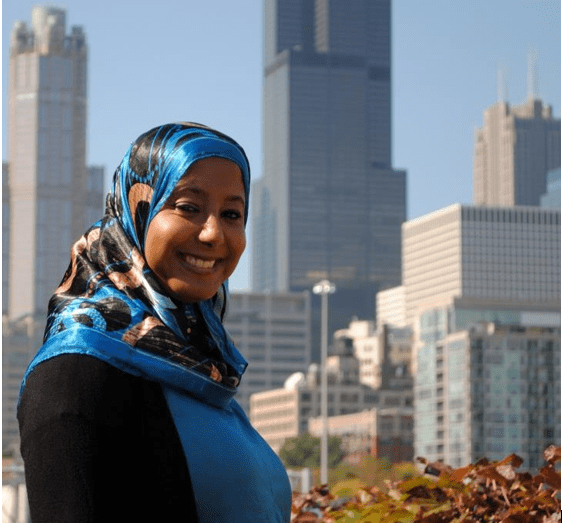 Hind Makki
Hind Makki
US history is defined by centuries of rigid racial hierarchy, with enslaved Africans and their descendants at the bottom of the heap.
Sudanese American Muslimah Hind Makki is the founder and curator of Side Entrance, which highlights the social placement of Muslim women in sacred spaces. Makki is also the managing editor of Hindtrospectives, a platform that centers the voices of African diaspora Muslims.
Makki is an interfaith educator with a degree in International
Relations from Brown University. She explores how religious pluralism in secular democracies intersects with race, class and access to social and political capital for minority communities. She is the co‐chair of ISNA’s Women‐ Friendly Mosques Taskforce and was an adviser to ISPU’s project, “Reimagining Muslim Spaces.” She asserts, “I probably spend the most amount of time thinking about is the development of Western Muslim identity: how does it happen, what does it mean for the West|East, and how can we actively and positively contribute|engage|love our societies?”
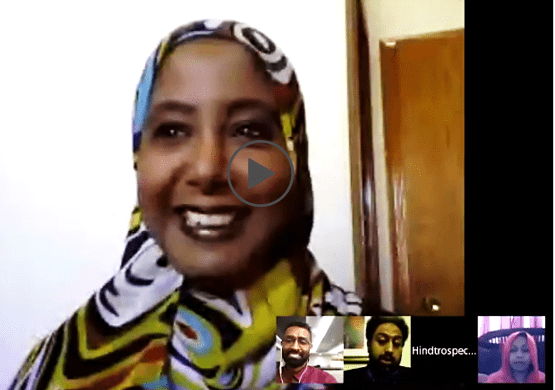
Makki asserts her African heritage and refuses to allow people to define her based on her physical appearance. She traverses the country discussing Black resistance and building ties of solidarity between Black Muslims of African American, Caribbean American, and Diaspora descent. Makki readily reminds Black Muslims about the interconnected nature of their oppressions and the need to combat all of it.
Visit Makki’s:
- Blog – http://www.patheos.com/blogs/hindtrospectives/
- Twitter – @HindMakki
- Facebook – https://www.facebook.com/Hindtrospectives/
 Asha Noor
Asha Noor
Black Muslims fall in a dangerous intersection, facing anti-Black racism and Islamophobia from both individual actors and the state.
Somali-American Muslimah Asha Noor is the Advocacy and Engagement Specialist for the Campaign to TAKE ON HATE, led by the National Network for Arab American Communities (NNAAC). She is a writer and social justice activist. Noor received her Bachelor’s Degree from Michigan State University in Political Science and her graduate at the School for Conflict Analysis and Resolution at George Mason University focuses on Somalia and conflicts facing the Somali Diaspora.
Noor has worked on numerous campaigns, townhalls, convenings, policy changes seeking a shift from the stagnant racial issues in the society and destabilizing the country’s White supremacist underpinnings. Noor appeared on NPR’s Kojo Nmandi Show discussing issues that Somali, Muslim and Arab Diaspora face in America and podcasts for both the Islamic Society of North America and American Muslim Health Professionals addressing issues of Islamophobia and the Muslim-American identity.
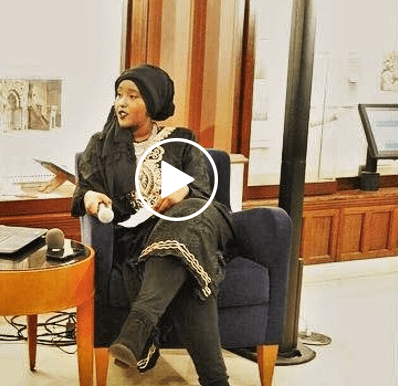
When Noor is not community organizing or speaking to thousands, she is on the ground protesting and encouraging her fellow Sudanese and American Muslims to gain a better understanding of the relationship between racism, xenophobia, and Islamophobia that feeds the layers of anti-Muslim bigotry and hate as well as the role of anti-Blackness in exacerbating those oppressions.
Visit Noor’s:
- Twitter – @RajooWeyn
- Facebook – https://www.facebook.com/asha.noor.9

